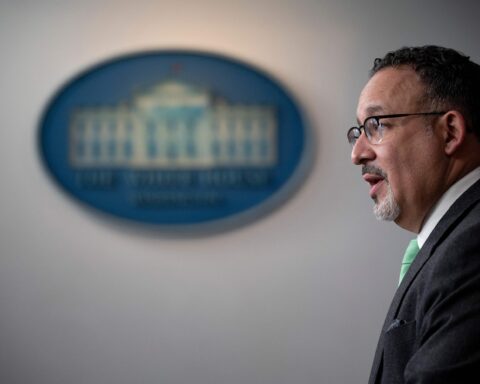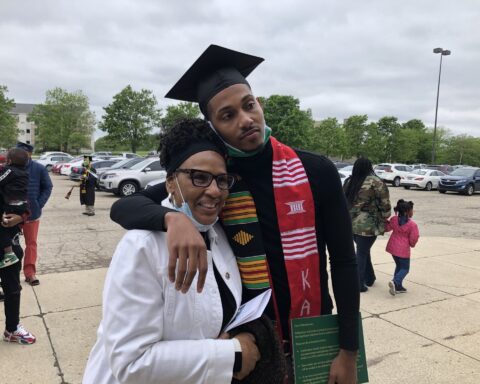Black borrowers say policymakers have ignored the racial and economic evidence of inequality in student loan debt with the majority insisting that canceling all student debt is the best solution to the crisis, according to a new report released Wednesday by The Education Trust.
The report, which focuses on the perspectives and life experiences of nearly 1,300 Black borrowers, likened the disparities to “Jim Crow.” Many respondents believed student loans were not set up to give Black Americans financial freedom and they disrupt their quality of life and mental health, according to the findings.
Some of the key findings from the study, “Jim Crow Debt, How Black Borrowers Experience Student Loans,” were that most Black borrowers do not believe student loans are “good debt.” They believe income-driven repayment plans are a lifetime debt sentence, limiting student loan debt cancellation harms Black borrowers the most, and that the majority would prefer the government to cancel their loans rather than offer lower interest rates or free tuition.
Jonathan C.W. Davis, a senior research associate at The Education Trust and co-author of the report, said the goal of the study was to call attention to how anti-Black racism, disinvestment in higher education, and the inequitable distribution of wealth in the country has a placed a burden on Black borrowers.
Leaders from The Education Trust say policymakers need to be held accountable.
“It’s an attempt for us to help shift the conversation away from the individual decision- making of borrowers themselves and situate blame where it should lie, which is with the broken systems and policies that have led to this crisis,” Davis told CNN.
The report found the notion that student loan debt offers a pathway for obtaining credentials that lead to higher incomes, greater wealth and social mobility is often not the case for Black borrowers.
“The framing of student loans as ‘good debt’ ignores the experiences of Black borrowers, who have less household wealth than their White counterparts and often have no option but to take out student loans to pay for college and the associated costs of attendance,” the report says.
According to the report, the median annual income for White men with bachelor’s degrees was $62,000 compared to $47,600 for Black men with bachelor’s degrees in 2018. The median annual earnings for White women with bachelor’s degrees was $50,000 compared to $42,100 for Black women with similar degrees.
In the study, 61% of respondents disagreed with the notion that student loans increased a Black borrower’s ability to build wealth. And 58% of respondents disagreed that student loans contribute to racial equality for Black student borrowers.
The report also found that income-driven repayment plans and limiting student loan debt cancellation based on income and amount borrowed was not helpful for most Black borrowers.
Income-driven repayment plans, for example, created lower monthly payments but growing student balances for Black borrowers because the payments aren’t covering interest and principal.
“They described their growing balances under IDR plans as ‘shackles on their ankle’ or ‘like Jim Crow,’ where the debt ensures that they will never have full freedom,” the report says.
Many of the respondents enrolled in income-driven repayment plans said they still have a hard time affording a savings account, health care, child care and food. Black borrowers surveyed had an average monthly student loan payment of $502.
Additionally, the study finds that many policy proposals for loan forgiveness disproportionately exclude Black borrowers. For example, many would not qualify for a proposal that caps student debt cancellation at $10,000 or even $50,000.
According to the report, Black borrowers are more likely to have balances exceeding $50,000, more likely to take on graduate school debt with hopes that more credentials will help them combat job discrimination, and less likely to amass wealth.
Biden has so far erased $9.5 billion in student loan debt for about 563,000 borrowers, the US Department of Education said in August. Those borrowers included victims of for-profit college fraud and those who are permanently disabled. Also in August, the Biden administration announced it was extending the payment freeze on federal student loans through January 2022 amid pressure from lawmakers and advocates.
However, Biden has stopped short of broad student debt cancellation.
The report found that 80% of respondents would like the government to cancel all student loan debt.
Victoria Jackson, assistant director of higher education policy at The Education Trust, said the organization supports student loan forgiveness of at least $50,000.
Jackson said The Education Trust backs other solutions such as doubling the Pell Grant, federal and state partnerships that offset tuition costs for public two-year and four-year colleges, and America’s College Promise Act that makes community college free.
“There are over 40 million people with student debt and those efforts (from the Biden administration) don’t go far enough to address the financial strain that those people are under, particularly for Black borrowers who we know are bearing the brunt of this crisis,” Jackson said. “What those actions show us is that cancellation is a possibility, it’s something that can be done.”




